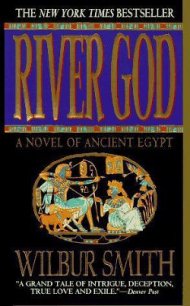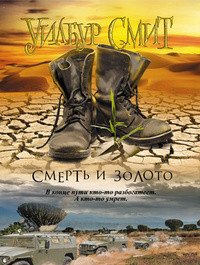Men of Men - Smith Wilbur (книги бесплатно без txt) 📗
"What about those diggers who cannot afford their share of the stagings?" Zouga persisted, and Rhodes shrugged.
"Either they find the money, or they will not have a wire down to their claims. From now on it's going to take capital to work a claim on New Rush."
"Those who haven't got it, will have to sell out, it's as easy as that."
"Since the cave-in the price of claims in the number 6 has dropped to 100 pounds," Zouga said. "Anybody who sells now is going to take a hell of a knock."
"And anybody who buys at 100 pounds is going to make a killing," Rhodes answered him, and lifted his pale blue eyes from Hayes" plans, and for a moment held Zouga's gaze significantly. He was giving advice, Zouga realized, but what impressed Zouga was the strength and determination behind that level gaze. He no longer wondered why somebody so young commanded such widespread respect on the diggings.
"Are we all agreed, then?" he asked.
With less than twenty pounds cash in the world and his claims cut off eighty feet below ground level and partially covered by the earth fall of the roadway, Zouga hesitated.
"Major Ballantyne." They were all looking at him. "Are you in?"
"Yes," he nodded firmly. "Count me in." He would find the money, somewhere, somehow.
They all relaxed, and Pickering chuckled. "It's never easy to play it all on one card." He understood.
"Pickling, didn't I hear your saddle-bag clink when you dismounted?" Rhodes asked, and Pickering laughed again and went to fetch the bottle.
"Cordon Argent," he said as he pulled the cork. "The right juice for such an occasion, gentlemen."
They swished the coffee grounds from their mugs and held them out for a dram of the cognac.
"The number 6 stagings, fast may they rise and long may they stand!"
Pickering gave them the toast, and they drank together.
Hayes wiped his whiskers with the back of his hand and stood up. "I'll have the quantities ready to send off on the noon coach tomorrow," he said, and hurried to his mount. Men who worked for Rhodes were always in a hurry. But neither Pickering or Rhodes moved to follow him.
Instead, Rhodes stretched out his long legs in the stained white cricket flannels and crossed his dusty riding boots at the ankles, at the same time offering his coffee mug to Pickering.
"I'll be damned if we don't have something else to celebrate this day," he said as Pickering glugged cognac into their mugs.
"The Imperial Factor," Pickering suggested.
"The Imperial Factor," Rhodes agreed, and when he smiled the cleft in his smooth chin deepened and the melancholy line of his full lips under the fair moustache relaxed. "Even this awful creature Gladstone has not been able to halt the march of Empire northwards through Africa. The Foreign Office has moved at last.
The Griquas are to be recognized as British subjects, and Waterboer's request has been granted. Griqualand West is to become part of Cape Colony, and of the Empire.
We have lord Kimberley's assurance on it."
"That's wonderful news," Zouga interrupted.
"You think so?" The pale blue eyes sought and held Zouga's.
know it to be so," Zouga told him. "There is only one way to bring peace and civilization to Africa and that is under the Union Jack."
immediately there was a relaxation of the relationship between the three men, an unspoken accord, so that even without moving they seemed to have drawn closer, and their talk was easier, more intimate.
"We are the first nation in the world and anything less than our total duty is unworthy of us," Zouga went on, and Rhodes nodded. "We destroyed the slave trade on this continent; that was only a beginning.
When you have seen the conditions that still exist, the savagery and barbarism, to the north of us, only then can you appreciate how deep that duty still is."
"Tell me about the hinterland," Rhodes demanded in that thin, almost querulous voice that so ill-suited his big loose-knit frame.
"The hinterland." It was an unusual term, but it stuck like a burr, and Zouga heard himself use it as he described that wilderness through which he had travelled and hunted and prospected.
Rhodes sat on a log of firewood, the shaggy leonine head sunk forward, brooding and silent, only his eyes quick and attentive, listening with an almost religious fervour, rousing himself every few minutes, lifting his head to ask a question and then letting it sink again to the answer.
Zouga spoke of the wide slow rivers that ran in their deep valleys where the cream of tartar trees grew upon the banks and in the green shallows herds of hippopotamus challenged the traveller with gaping pink mouths and curved white tusks.
He described the deadly malarial swamps, vast stands of papyrus reeds swaying like dancers from horizon to horizon, where the sky pressed down, smothering the world under a heavy blue blanket sodden with steamy vapours, and he told of the relief of climbing the steep rocky escarpments to the cool high plateau of golden grasslands.
With words he showed them the vast and empty spaces, the plains dotted with moving herds of wild game, the cool green forests of standing timber, the streams of sweet water, crystal cold, from which a man could water his herds or his homestead.
He talked of vanished kingdoms of long dead kings, the Mambo and the Monornatapa, who had built cities of massive grey stone and left them to the smothering vines, their idols thrown down and shattered, the foundations of the walls menaced by the twisted grey python roots of the wild fig trees which found the joints in the stonework and forced them inexorably apart.
He told them of the square mine shafts that these vanished people had driven into the matrix and then abandoned, leaving the gold-bearing quartz where they had piled it before they fled.
"Visible gold,"he told them, "thick as butter in the reef.
Lying out there in the bush."
He spoke of the people, the remnants of the subjects of the Monornatapa, their glories long past, decimated by war. He told them of the conquerors, the Matabele, the cruel legions from the south, calling the subservient tribes "cattle" and, contemptuously, "Mashona, eaters of dirt", taking them as slaves, killing them as sport, to prove their manhood, or merely on the king's whim.
He described the wealth of the Matabele, their uncountable herds of cattle, thousands upon tens of thousands of fine beasts, glossy hump-backed bulls whose blood lines ran back to Egypt and the land between the Tigris and Euphrates, big rangy animals with widespread horns and hides of every colour from unrelieved black to purest white.
He told them of deep and secret caverns in the hills where the priests of the vanished kings still conducted their mysteries and sustained the oracle, weaving a gossamer net of witchcraft and magic which enfolded even their proud and arrogant Matabele overlords.
Then, as the day wasted away and the sun began to set behind a flaming curtain of red dust, Zouga told them of the kraals of the Matabele, the impis trained into the most merciless killing machine Africa had ever brought forth, racing barefoot into battle behind their tall rawhide shields, the plumes nodding and streaming from their dark heads and the dazzle of their assegais lighting the plains as the stars light the night sky.
"How would you fight them, Ballantyne?" Rhodes fired the question harshly, and it checked Zouga in full lyrical flow. They stared at each other for a moment, but a moment that was fraught with portent, a moment in which the lives of many thousands black men and white teetered in the balance. Then slowly the arm of the balance came down on one side, and the destiny of a continent moved, like a fiery planet shifting its orbit through the universe.




